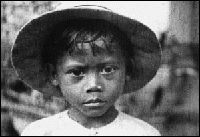|
|
|
監督・脚本:ヴィンセント・モニケンダム
Director, Script : Vincent Monnikendam |
1936年、オランダ、ハーグ生まれ。1964年から30年間NOSテレビとNPSテレビでドキュメンタリーの監督、製作、編集を手掛ける。1995年独立し、インディペンデントのドキュメンタリー作家として、主に移民や人種問題をめぐる作品を発表している。主な作品に、ハーグの新しい移民ゲットーを扱った『District 69』(81)、トルコやギリシャ移民の生活を描く5部構成の『The Ten Token』(85)、オランダの温室産業で働く不法移民たちを、彼らと6カ月にわたり生活を共にしてドキュメントした『The Illegals』(91)など。1995年、6年がかりの大作『マザー・ダオ』を完成し、世界各地のドキュメンタリー映画祭で高い評価を受けた。 Born in 1936 in Hague, the Netherlands. For 30 years from 1964 onwards, worked as director, producer, editor of documentary film for NOS-TV and NPS-TV. In 1995 went independent, and continues his activities as a documentary filmmaker. Most of his works concern issues such as immigrants and race problems. They include: District 69, depicting the life in the immigrants ghetto in Hague; The Ten Token, a five-part film on Turkish and Greek immigrants in the Netherlands; and The Illegals, a documentary on illegal Turkish and Moroccan workers in the Greenhouse industry, for which Monnikendam spent 6 months living amongst the workers. In 1995 completed Mother Dao the Turtlelike which took 6 years in production, and was acclaimed at documentary film festivals all over the world. |
 |
|
|
監督のことば オランダ国立フィルム・アーカイヴから提供された260,000メートルにおよぶ35mmの可燃性フィルムがこのドキュメンタリーの元の素材となった。90分にわたりこの映画は、オランダがいかにしてその植民地を植民帝国として運営していたか、そして当時その関係はどうであったかを見せることを目標にしている。いわゆるナレーションは排除され、代わりにインドネシア語の詩や歌をデジタル・サウンド・コンポーザーで構成している。『マザー・ダオ』を観る者は、1920年代の植民地機構が、どれほど西欧とかけ離れた世界に植え付けられていたかを目のあたりにし、当時その頂点にあった植民地経営のさまざまな姿を目撃することになる。映画のおかげでその姿が記録されていた。1912年から 1933年にかけて1,000メートルを超えるドキュメンタリー映像が可燃性フィルムで撮影された。このすべてがオランダ国立フィルム・アーカイヴのコレクションに属し、その大部分が保存されている。このドキュメンタリーはまず西スマトラのニアス島の島民に伝わる伝説の概略から始まる。この伝説によれば、大地は地母神ダオにより創造された。海岸に立ったとき、地平線が島民たちの目には亀の甲羅のような曲線に見えるという。そこで人々はこれを“亀のような地母神ダオ”と呼んだ。永遠の時の流れのある段階で、地母神は身体の汚れを集めてその膝でこねあわせて玉にしたという。それが世界だ。後に、彼女は男を知らぬままにみごもり、男女二人の子供を生み落とした。この二人が最初の人間で、豊穰の世界で暮らした。そしてこの豊穰の世界がヨーロッパ人たちをひきつけ、とりわけオランダ人がその植民化の努力に向かったのだ。『マザー・ダオ』は48の国際映画祭で上映され、5の金賞を含む18の賞を獲得してきた。オランダでは 1995年の最優秀映画に選ばれている。 |
Director's Statement More than 260,000 meters of 35mm documentary nitrate film footage from the Dutch film archives served as the source material for this documentary. In a span of ninety minutes the film aims to show how the Netherlands administered its colony as a colonial enterprise and what the relations were like at the time. The usual commentary has been omitted and in its place poems and songs in Bahasa Indonesia have been included in a digital sound composition. In Mother Dao the Turtlelike, the viewer sees how the colonial machinery in the 1920s was implanted in a world so different from Western Europe. He or she will witness various phenomena and aspects of that colonial enterprise --then at its peak--which, thanks to cinematography, were recorded. The shoots for the more than one thousand 35mm nitrate documentary films took place in the Dutch West Indies between 1912 and about 1933. All belong to the collections of the two Dutch film archives, and in the meantime the main corpus has been preserved. The documentary starts with a shortened version of the legend of the inhabitants of Nias, an isle to the West of Sumatra. It was told that the earth was created by Mother Dao. When standing on the beach, the inhabitants of the island could see the horizon half curved like the shell of a turtle. So they called the creator of the world ' Mother Dao the turtlelike. ' At some point in time eternal, she collected the dirt off her body and kneaded it on her knee into a ball. That was the world. Later, she became pregnant, without knowing a man, and gave birth to a girl and a boy. They were the first people and they lived in a fertile world. And it was this fertile world that attracted the Europeans, and especially the Dutch, in their colonial endeavors. Mother Dao the Turtlelike has been screened at forty-eight international film festivals and has received eighteen awards and prizes, among them five Golden Awards. The film was proclaimed the best Dutch film of 1995. |
